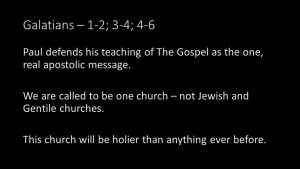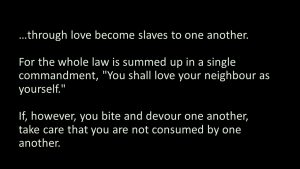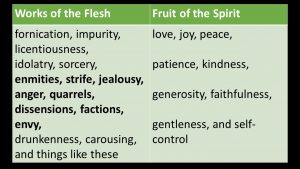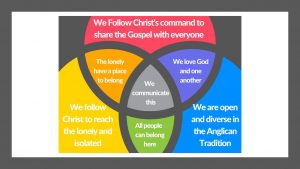A sermon offered 3 July 2022
By The Rev’d Ann Edwards
Galatians 5 and 6

This work is licensed under a Creative Commons Attribution-NoDerivatives 4.0 International License.
At the Southern Queensland Synod last week, the Archbishop made an address which included, amongst many other important things, his assessment of the legality of blessing civil unions. It is, as he said, a hot-button issue. Let’s be clear first that his comments were about the legality of blessings of relationships in our church, no change is proposed to our marriage service. There was also discussion in the proceedings about our code of conduct, and an amendment to the definition of the expectation of the sexual behaviour of our parish council, wardens, musicians, lay workers, and clergy should be defined. These are complex issues, and warrant a detailed and careful conversation, which is far beyond the scope of my sermon today. But even without detail, we know that human sexuality is a sensitive and polarising issue in our church, and in the wider world. We have in our church family a diversity of beliefs about how sexuality and theology interact, and sometimes it’s a sore point, even a wound.
When I did Pastoral Education, my supervisor told me that pastoral care wasn’t about avoiding the sore point: to diagnose and heal a wound, sometimes we have to gently touch it, so we can correctly identify and address the source. As much as my personal thinking is clear on how we should navigate this current discussion, after years of prayer and reflection, I did wonder how I could come alongside you, how we could work together. Of course, God had it in hand.
On Monday, I turned to the readings for today, and saw Paul’s letter to the Galatians. The Holy Spirit has once again delivered the perfect reading via the lectionary this week. You’ll note that I opted to include the preceding text, Galatians 5, as the first reading. To understand Galatians 6 it is necessary to put it into the context of Galatians 5 – Paul is an orderly thinker, and builds an argument comprehensively. It’s appealing to us Anglicans, as we also build on tradition, reason and scripture in our approach to life and community.
The letter to the Galatians was written at white heat – the new Christian community in south Galatia was at war with one another, in a perilous time in history. NT Wright describes the letter to the Galatians as a “very specific, and very agitated, message to one particular group of congregations at one remarkable moment in the very early church.”
Paul was absolutely consistent in his writing – the person of Jesus, who we encounter in the Gospel, who died and rose again, and who sent the Holy Spirit, reshapes our lives and allows us to be a part of God’s new creation. This was true then and there, and is true here and now. The one God entered creation in the person of Jesus. He died, rose again, releasing us from sin and death, and sent his Holy Spirit to transform us. Hallelujah!
Paul spoke this truth to the early church, in a world where idols were everywhere, and worshipping them was compulsory. Daily life meant acknowledgement of the divinities, processions, festivals and sacrifices where it was assumed everyone would join in. If you displeased the Gods, terrible things happened, so to neglect these duties was to be a danger to society.
In Roman territories, the Jews, however, were exempt. They had negotiated to pray to the one God for Rome. The early Christian church was indistinguishable from the Jewish community as far as Rome was concerned, and enjoyed many of the same protections. That’s a good outcome in a violent world. But now, word was getting back to the Jesus-believers in Jerusalem, including Jesus’s brother James, that Paul was including all sorts of people that didn’t look Jewish, and didn’t act like Jews. They were noticeable – they were uncircumcised, they didn’t follow a kosher diet, and yet those same people also didn’t participate in the pagan worship required in their society. They claimed the worshiped the same one God. Society around these misfits was getting riled, and the precarious protections of the Jews and Jewish Christians were at risk. And maybe, quietly, the change they represented was unnerving – the idea of shedding the longstanding requirements of the law was maybe really not that good an idea? So, they came and called the Galatian church into line. You could ask – whose line was that? Well, let’s explore the text.

The macrostructure of Paul’s Letter to the Galatians looks like this. Paul writes, as he has clearly been undermined by those that want the Galatians to conform to Jewish culture and law. He begins by reminding the Galatians who he is and what he taught, before tackling the key problem. Gentile believers are full believers in Jesus, they don’t need to look or act Jewish. To comply with making an obvious sign of compliance to Jewish law – for men to undergo circumcision – is a backwards step. These believers already have the Holy Spirit, they already are members of the community – to comply with surface and legalistic elements of the tradition means to refuse the gift of grace and salvation that is the life, death, and resurrection of Jesus, and the abundant gift of the Holy Spirit.

This letter addresses a direct problem, informed by Paul’s understanding of Jesus, but written for a purpose. There are other letters that are more full descriptions of Paul’s theology. However, this letter was written to a church at the brink of schism, one that was tearing itself apart. One in which people were metaphorically biting each other, and well on the way to devouring the community. Paul calls them back to love – and gives the description of how this community can pull itself back from the brink – a message equally relevant in our world today.
Paul unequivocally called the church to unity, and made clear that this is only possible if we shed our own agendas and look outwards to our church neighbours, and our neighbours in the world.
That’s not to say that it’s a free for all with regards to behaviour. While free from legalistic requirements, Paul’s prophetic vision for God’s community is far holier than anything the world had seen before.
We’re called not just to be rule followers, but to be transformed. To be set aside for God’s purpose. Paul contrasts the behaviours that come from our own desires with those that follow the direction of the Spirit.
When we hear the word “flesh” what sort of sin is brought first to your mind? Often, when I’ve asked this, the answer is sexual sin, sometime drunkenness and greed. The Galatians would expect to hear the same.
Paul brackets a comprehensive list of selfish sins and uses the obvious as brackets – outrageous and unloving sexual behaviour as a start, the obvious rejection of God in that Pagan world, and a good measure of drunkenness and wild partying to finish.

But the heart of Paul’s message about self-indulgent sin might surprise us, and may well have surprised the Galatians. Enmities, strife, jealousy, anger, quarrels, dissensions, factions, envy are just as obvious wilful and selfish behaviours as unrestrained sexual gratification and wild and uncontrolled partying. None of these come from God. Somehow, in our churches, we’re quick to judge some and not others.
Worse still, we’re quick to judge on other standards. Remember Paul’s opponents, that attempted to pull the Galatians back into line? The ones who said Paul had the Gospel wrong, and contorted the Gospel to make believers conform to the Jewish law? To force men to be circumcised? Whose line was that?
Galatians is a gift for right now – a whole letter in our scripture directly telling us that our call is to unity and community, describes that community, and assures us that God will be undeniable to the world around when people see our differences, and then see us getting on with the work of love and justice anyway.
That’s not to say it’s live and let live, and we all go on our merry way. Our community has a responsibility to correct someone that is off track. However, that correction must be from the Spirit, not from our own desires for conformity or from an unfounded fear of provoking God’s anger. It’s spiritual work, and the minute we feel that grip of needing to win, of control, of fear, we’re in territory of flesh, scalpel to circumcise ready, and we must step back. If we’re feeling wobbly, or unsure of ourselves, at risk of losing our self-control, we also step back. Basically – if someone needs correcting, and our response is driven by our own needs and identity, and not love for the one in front of us, step back.
Because the flesh doesn’t correct gently, it divides, causes strife, enmity, and disorder. In the Spirit, we share each other’s burdens, and we carry our own load. While this sounds contradictory, it means that we are with each other in our struggles, but we also pull our own weight, and allow others to do the same. Super heroes and shirkers alike are not doing God’s work of community.

The visioning work completed here at St Mark’s was, to my mind, the expression of the Holy Spirit. And as I re-read this summary today, I see Paul’s hand in the Letter to the Galatians, with his unmistakeably large letters. We follow Christ, we look outwards to our neighbours and bring them in, and we apply reason, scripture, and tradition in our journey, holding together in the tension of difference because we agree on Jesus. We are united, which is an ever-continuing work of the Spirit.
With that in mind, and with Paul’s instruction to gentle correction, as your priest, I am for the first time, and I hope the only time, going to ask you to follow an instruction.
Don’t create a line that that excludes people, in your own wisdom. Division and dissent are works of the flesh. This week, that includes our attitudes towards sexual diversity.
As a national church, at our General Synod, we apologised this year for our mistreatment of people based on their gender identity and sexuality. Conversion practices do not work and have harmed those the church promised to help. Exorcisms, hypnosis, aversion therapy, pseudo-science talk therapies, and rejection have left people traumatised, anxious, depressed, and led some to take their lives. We rejected those God called. And so, faced with that reality, this year as a national church, united across our Conservative and Progressive constellation, we have repented and apologised.
The reality is that there are people who are gay, and people who are gay belong to our church, and will enter our church and become part of our community. Of course they will. They come seeking Jesus, and will be fully included, to learn, live, and serve in unity.
I have a friend that was gay, and remained celibate out of his love for God and his understanding of scripture. I have friends and family that are gay and partnered in healthy relationships, caring for one another. Some are married, some believe marriage is a heterosexual institution. The decision they make about their relationships, the way they seek to live faithfully, is for no one else to judge.
I have friends who are gay who believe Jesus will never be ready to welcome them, because that is what they were taught. Friends for whom the church is a literal terror. I also know too many gay people who complied with the church’s expectations and married a person of the opposite sex, praying they would change, believing that they could, with disastrous results for all concerned.
At the same time, I have friends and family, in the church and out, that can’t bring themselves to accept unions between people of the same sex.
What does Jesus want? Really?
What comes next for us, here, at St Mark’s?
We have the model in this church of our many families who disagree on all sorts of things – political, moral, theological, philosophical – across generations and people. They stay together out of love for one another. They don’t leave. They don’t exclude. They tolerate the difference, because they know what the family is for, why they are together.
I ask you to do in God’s love what the world would say is impossible – disagree and stay united.
Remember to love God first, and that God calls us to be one church.
Don’t draw the dividing line that God doesn’t draw.
Love your neighbour, as you love yourself. Including those with whom you disagree.
Judge as you wish to be judged.
Listen in the same way you yearn to be heard.
If you are uncomfortable – stay.
If you are confronted – look for Jesus in the face of the person in front of you.
If you are unsafe, come to me.
If you are over-joyed, or devastated, or confused, or concerned – come and talk to me. Come on your own, or in small groups.
Be gentle. Be kind. Be faithful to your church community.
Because division, anger, enmity, and dissent are signs that we are veering away from God’s purpose for us, and this community knows too well what that is like.
My only expectation of you is that you will conduct your life as best you can, with what you have, discerning where God is calling you. I also expect that every single person that walks through our doors will be respected for who they are and given the grace and space to follow God’s call in their lives in God’s time. That is it.
Each of us is moulded and shaped from our birth through to our final breath. The priorities for that work are God’s: not the church’s, not the Archbishop’s, not mine, not any other person’s. The priorities are God’s.
The God loved the world so much, God entered the world, not as a conquering hero, but as a vulnerable infant into a vulnerable family. Jesus taught us how to live, corrected our way, set the model for our church, and experienced the worst of human cruelty and rejection anyway. Jesus died, yet rose again, conquering death and sin once for all. The invitation into God’s family became open to everyone through Jesus. Every barrier between creator and creation was torn apart, and the Holy Spirit continues God’s creative work in the new creation of our church today. On that we should agree, and that is good news.
The grace of our Lord Jesus, the Messiah, be with your spirit, my dear family. Amen.
Wright. N. T. (2021). Galatians. INscribe Digital.
